How Long Does The Flu Last?
It’s true, having the flu is not fun! When you first get the flu, you probably don’t even know that you have it, or that you can spread it. You may also feel like you’re sick for longer than usual, so we are going to give you the day-by-day timeline of what to expect when you get sick. We also have some tips on how to speed up your recovery, and symptoms of the Flu vs. COVID-19.
So how long does the flu really last? Well, some would answer that question with “Too long!” But the truth is, the flu lasts from three to seven days, according to the CDC. If you are normally healthy, the flu can be short lived, but your cough and tiredness may stick around for two weeks.
STAGES OF THE FLU
Day Zero:
On day zero, you probably won’t know that you have the flu, but you ARE contagious at this time. You will be able to go on with your day and normal activities without even knowing that you are sick. You most likely contracted it from someone within the last 48 hours.
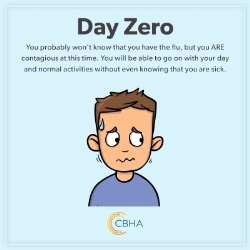
Days 1-3
On day one, you will start feeling sick! And you may feel VERY sick for the next 3 days. Unlike the cold, where you slowly start to feel symptoms, the flu will hit you all at the same time. Here are some symptoms that you should look out for:
- Headache
- Weakness
- Dry Cough
- Sore Throat
- Muscle Pain
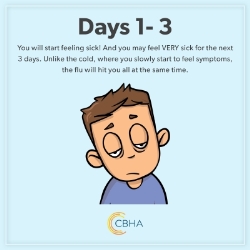
You will quickly feel exhausted while doing your normal activities and begin to run a high fever.
Day 4
The worst days of the flu are over. You will start to notice your fever is going down and less achiness in your muscles, but a cough and sore throat are normal at this point. You will still feel very tired, and may have some chest discomfort, making you want to rest in bed all day.
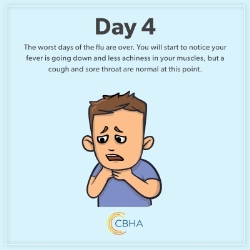
Day 5
On day 5, you should start to see the end of this illness. If a fever occurs or you feel a lot worse, call your doctor. “Please come in to see us if you have not started to feel better after Day 5,” says Tiffany Carter, PA-C “Another infection may have come up, like bronchitis or pneumonia, which requires antibiotics and we will be able to assess you and provide the correct treatment that you need to get healthy again.”
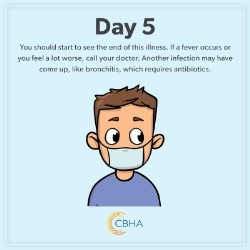
Day 6 and Beyond
Your symptoms should start disappearing, but you may still have a cough and feel tired for the next 2 weeks. That’s normal! Other than that, you should start to feel like you are on the other end of this sickness.
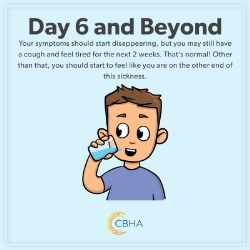
Everyone experiences the Flu in different ways. Some patients will have chest discomfort and cough, while others will show symptoms of a stuffy nose, sweating, chills, nausea and other symptoms. It’s important that you stay hydrated and rest to help reduce your symptoms.
FLU RECOVERY TIPS
REST – Staying at home, away from others and resting is the most important way to recover from the Flu. You need to focus any of the energy you have left on getting better. Which means, you may need to order take-out, get a friend to run by the pharmacy for you and even cancel any events coming up on your calendar.
STAY HYDRATED – Drink plenty of fluids! This is key to thinning mucus and feeling better, FASTER! Being dehydrated can lead to headaches and more body aches, so make sure you are drinking lots of water, tea and broths. Electrolyte drinks will help with vomiting.
WASH YOUR HANDS – This one may be an obvious one, but if you live with others it’s important that you don’t spread the infection to them. Stay in one room and wash your hands after every sneeze, blowing your nose or touching your face.
USE A HUMIDIFIER – If you are congested and are having a hard time sleeping, a humidifier is an easy way to loosen mucus and help you breathe easier. Make sure you are constantly changing the water to avoid mold from growing in the container.
Flu vs. COVID-19
Now that Flu season is upon us, it’s important to be able to tell the difference between Flu and COVID. They both spread differently and affect people differently depending on the person and their health. COVID-19 is more contagious and spreads more quickly than the flu. It also takes longer to experience COVID-19 symptoms than Flu symptoms.
Some other differences are:
- COVID symptoms appear 2-14 days after exposure
- COVID is often accompanied by loss of smell and taste
- Flu symptoms will show up 1-4 days after exposure
- Flu can be treated with antiviral drugs
Learn more about COVID-19 symptoms, visit our blog post.
WHO IS AT RISK FOR THE FLU
The flu can come with complications like bronchitis and pneumonia. These infections can lead to being in the hospital for a long period of time, or even death, if it is left untreated. The flu can also lead to secondary infections like dehydration, acute lung injury, septic shock, respiratory failure and multi – organ failure.
Those who are at a higher risk for the flu potentially turning deadly are:
- Pregnant Women
- People over the age of 65
- Kids under five years old
- Individuals with chronic health issues
The flu strain changes every year, and that is why we recommend that you come in each year to get a new shot and have immunity against the current season flu.
Schedule an appointment at any of our clinics today and protect yourself from the Flu!
Source: info.totalwellnesshealth.com/blog/stages-of-the-flu